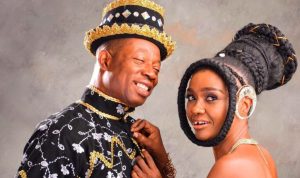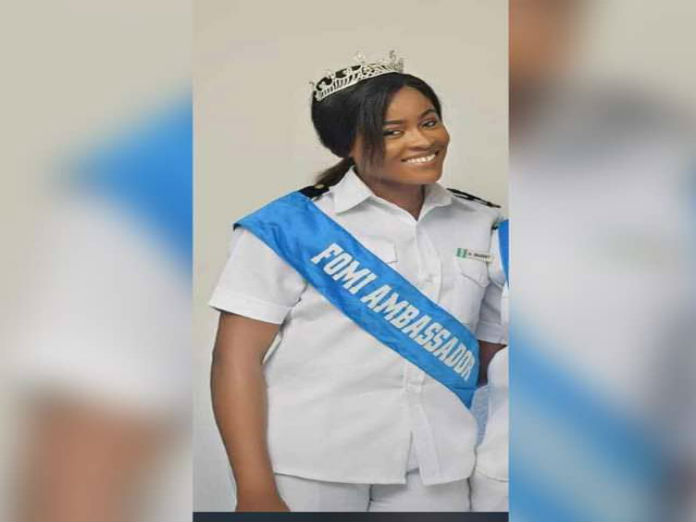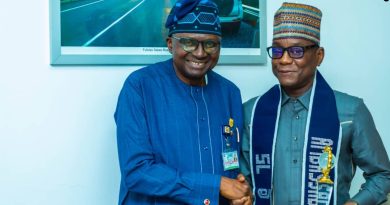25 years of Goge Africa showcasing Africa’s endless possibilities
Background
Ambassadors Nneka Isaac Moses and Isaac Metche Moses tied the knot on October 25, 1997. Just one year into their marriage, they embarked on a new venture together: the creation of Goge Africa. This groundbreaking television programme made its debut on October 1, 1999, airing on four different Nigerian television stations; AIT, NTA Channel 5, MITV, and DBN, on same day but at different time belts Since that memorable day, the couple have remained steadfast in their lifelong commitment to each other as a couple and to the promotion of their brand, Goge Africa. This brand is dedicated to celebrating African culture, music, fashion, food, arts, crafts, and people, while also highlighting tourism and investment opportunities across the continent. Through Goge Africa, they showcase Africa to the world as a premier destination, using Nigeria as their primary launchpad. As they approach their 25th anniversary milestone, the Goge Africa Team have planned a series of activities throughout the year to celebrate. The inaugural event, titled, Face of Goge Africa (FOGA), kicked off in full swing last month.
Andrew Iro Okugbowa recently paid a visit to their luxurious office in Maryland, Ikeja, Lagos. Recognised globally as one of the most prominent couples, they have successfully built a business empire together. During the visit, they shared insights into their life journey and travel experiences
How it all started
Isaac: “Goge Africa was born out of a perceived neglect of Nigerian and African music. At the time of its inception, Nigerian and African music were not receiving the recognition they deserved on our airwaves. Radio stations predominantly played American Hip-Hop and other international genres to attract viewership and sponsorship. During that period, I was also hosting a radio show and managing artistes like Segun Arinze, Healing Child, and Tina Onwudiwe, among others. Despite knowing that these artistes produced quality music, I couldn’t feature their songs on my radio show.
The producer believed that playing local music could potentially lower the show’s ratings. After some time, I decided to quit the show to pursue a project where I could have full control over its direction. I discussed my idea with Nneka, proposing that we collaborate on a radio show to promote African music and culture. She then suggested, “Why don’t you take it to TV so I can design your costumes?” At that time, she was deeply involved in fash- ion, selling fabrics; designing, and producing ready-to-wear clothing at Akenn.G Limited in Surulere. I responded, expressing concerns about the high capital requirements for television production, especially since I was primarily a voice-over artiste, model, and upcoming Nollywood actor as well as I didn’t have that level of financial resources.
However, she reassured me, “You never know how it will turn out. Let’s join forces financially and I’ll also handle the costumes. Let’s take it one day at a time.” I responded, suggesting she co-present with me since viewers might be drawn to the show be- cause of either of us. She declined, stating she wasn’t interested in show business or TV presentation. I explained to her that the show wouldn’t be live, allowing us the opportunity to refine and perfect each episode. Additionally, we could hire an editor to edit the content for us. That’s how Goge Africa began, initially focusing on showcasing our local musicians. Over time, we expanded our reach to other African countries, promoting their musicians and featuring their music. However, as time progressed, we realised the importance of delving deeper into the cultural aspects of our people. Incorporating cultural performances Isaac: The idea came to us after attend- ing a vibrant burial ceremony filled with celebration. The dancing, rhythmic movements of our women, and the voice chants without musical instruments were captivating. The performances by the vil- lage women were not only exhilarating but also colourful and deeply appealing. I thought that capturing these moments and featuring them on our show would make for compelling viewership. We agreed on the idea, and Nneka began filming these cultural activities in various villages across Nigeria and other countries. Due to budget constraints, Nneka often had to rely on our Panasonic mini-DV camera for filming as we most times could not afford a cameraman. I would go to a sound studio to narrate the voice. The editor handled the post-pro- duction, and the result was captivating. People began to take notice and often com- mented, ‘Come to our village; our dance and 25 years of Goge Africa showcasing Africa’s endless possibilities festival are even more intriguing.’ This initial spark ignited a journey of exploration and discovery that evolved over the years. As we delved deeper into promoting African music and culture, we had the opportunity to meet talented artistes and visit renowned record labels across the continent. Through these encounters, we crossed paths with iconic figures in African music. Interacting with legendary African artistes Interestingly, our first meeting with Femi Kuti took place in Paris, where we also had the pleasure of meeting Manu Dibango, Aw- ilo Logomba, Mori Kante, Ray Lema, Yondo Sister, and many others.
This journey has been a testament to the richness and diversity of African music, and it continues to inspire and drive us forward. During our visit to South Africa, we had the opportunity to meet Nicky Blumenfeld of Kaya FM. 95.9. She introduced us to prominent record labels in South Africa, including Gallo Record Company, Sony Music, and others. These labels arranged for us to interview re- nowned artistes such as Brenda Fassie, Ringo Madlingozi, Vusi Mahlasela, Gloria Bosman, Bongo Maffin (comprising Apple Seed, Red, and Thandiswa), Zola, and many more. Whenever these artistes released a new al- bum, they would send us their music videos for publicity on Goge Africa. The name Goge Africa Isaac: We aimed for the show to stand out from regular programming by being more comprehensive.

That’s why I chose the word “Goge.” In Hausa culture, “Goge” refers to a musical instrument with strings stretched across a calabash. This instrument is indigenous to North- ern Nigeria and other parts of Africa. While it’s called “Goge” in the North, it’s known as “Goje” in the Southwest and “Kraal” in Ethiopia. In Hausa, “Goge” also means ‘to clean’ or ‘wipe clean.’ We found the name memorable and meaningful, so we decided to go with it for our show.
Promotion of tourism
Nneka: “Twenty-five years later, our focus has naturally shifted towards promoting tourism.
Interestingly, even in our early days, we inadvertently promoted tourism through storytelling. As we narrated our tales, we invariably highlighted the beauty of the places, the warmth of the people, the richness of their culture, the tantalising cuisines, the vibrant costumes, and their unique way of life. The impact of our storytelling became evident when we began receiving emails from viewers expressing their desire to visit the places we showcased. They inquired about honeymoon destinations, travel logistics, visa procedures, and more. Recognising this growing interest, we ventured into consulting, offering guidance on travel destinations and promoting curated tour packages. This evolution seamlessly blended our passion for storytelling with a new- found commitment to promoting travel and exploration.
Isaac: “This marked the beginning of tour operators offering packages inspired by the destinations we featured on Goge Africa. Back then, the landscape was quite different: we didn’t have the influence of social media, travel bloggers, or vloggers, and Google maps were yet to be introduced. Despite these challenges, our passion for our work never wavered. Our primary goal was to showcase the richness and diversity of Africa, highlight- ing its unique offerings. We aimed to shift the narrative away from predominantly Western values and spotlight the beauty and value of our own culture and heritage. This mission drove us forward, fueling our commitment to promoting Africa’s trea- sures and fostering a deeper appreciation for our continent. Costumiers and designers Nneka: Sister Bucks, a renowned fashion designer from South Africa, was instrumen- tal in dressing us during our early visit to South Africa. She had previously designed outfits for iconic figures such as the late Nelson Mandela and Brenda Fassie.
From Ghana, we collaborated with Nallem and Frank Osodi, the talented designer behind my wedding gown and 20th wedding anniversary ensemble. Additionally, designers like AFAM in Enu- gu, the legendary Modela Couture, Regalia, FERON, Araewa Couture and many others approached us with their creations, eager for exposure on our show. We took great pleasure in showcasing their wonderful designs, cele- brating the diversity and creativity of African fashion. Inaugural episode of Goge Africa premiered on October 1, 1999 Nneka: Our first shoot took place at the National Arts Theatre in Orile-Iganmu.
I remember feeling quite nervous and appearing stiff on camera. After reviewing the footage, we decided not to use it, although we still retain the footage to this day. Initially, our show was named ‘Dance Af- rica.’ During this phase, we even captured footage in New York while engaged in trade. We crafted African attire to sell in America, using the proceeds to purchase foreign clothing to sell in Nigeria, which was the business of Akenn. G Limited. We noticed a preference among Nigerians for foreign fashion, while Americans showed interest in African designs. Armed with a small Panasonic camera, we encouraged people to share their thoughts on ‘Dance Africa,’ resulting in feedback primarily from Black Americans referring to it by that name. However, during a subsequent shoot at Eko Hotels and Suites in Victoria Island, Lagos, our direction began to shift. We focused on the hotel’s art market area near the en- trance. During this shoot, Isaac picked up the Goge instrument as he conversed in Hausa with the local Hausa Art merchants. He introduced the name ‘Goge Africa’ which resonated well with them, leading us to adopt it as our show’s new name. Rejected by NTA Network Nneka: Our initial pitch to NTA Network ended in rejection. I still hold onto that rejection letter, signed by Cordelia Eke, which described Goge Africa as ‘fetish’ and unsuit- able for public broadcast. While disheartened, the rejection fueled our determination. Interestingly, when faced with a ‘yes,’ our resolve might waver, but a ‘no’ only strength- ens our commitment, especially when we’re passionate about our cause.
Determined to challenge the perception that African culture is ‘fetish,’ we delved even deeper into our rich cultural heritage, aiming to showcase its beauty and significance. Staying on course Isaac: I would attribute it to dexterity-our ability to effectively portray and narrate our culture in a way that captivates and engages viewers, offering something distinct from typical TV programming. Nneka: While viewers were drawn to the adventurous and vibrant nature of our show and our unique presentation style, the cultural elements often didn’t resonate as strongly then, particularly among younger Africans influenced by Western culture. Some brands even suggested incorporating foreign music, given the popularity of artistes like Michael Jackson, Kool and the Gang, and hip-hop acts at the time.
They believed this would attract a larger audience and were willing to invest substantial funds if we made this adjustment. After receiving the suggestion to incorporate foreign music, we deliberated on it but ultimately chose to reject the idea. Many were already following that path, and we wanted Goge Africa to remain authentic to its roots. Consequently, we turned down offers from the two major brands and persisted in producing Goge Africa on our modest budget. Despite facing disinterest from government officials and minimal external support, our dedicated viewers embraced our content. We received numerous positive reviews, commendations, and unwavering support from our audience, reaffirming our commitment to staying true to our vision.

Turning point Isaac:
“Our breakthrough came when advertising agencies began to allocate spots for us.”
Nneka: To be candid, at the time, stability remained elusive, even though we garnered significant attraction. Every closed door seemed to lead to an open one, simply because we kept knocking. Despite facing challenges with advertising agencies, a lack of brand partnerships, and limited government support, we found our champions within the local communities we served. I recall an incident during our first year when we attended the Akwa Ibom Day celebration at Tafawa Balewa Square (TBS) in Lagos.
Despite not being officially invited and subsequently being turned away at the gate, we remained undeterred. Armed with our camera and my role as the cameraperson, we stood outside, determined to capture content for the four channels airing our programmes. As we brainstormed ways to gain entry, we were fortunate to encounter Ms. Obot Etuk, a Nollywood actor from Akwa Ibom. Upon learning of our situation, she graciously escorted us inside and introduced us to the event organisers. Following the broadcast of our coverage, Obot reached out, expressing the community’s desire to obtain a copy of our VHS video, noting that our coverage stood out for its quality and presentation. In the spirit of collaboration and community, we provided them with the footage at no cost, further solidifying our bond with the local communities we aimed to serve.
Isaac: “When we learned about the coronation of the Jaja of Opobo in Rivers State, we didn’t hesitate to take a flight there that December.
Many people shared their perspectives on the coronation, we aired our coverage despite not being officially invited to the event. Sometime later, we received a call from none other than the Amanayabo of Opobo, King Dandison Douglas Jaja. He informed us after watching it in London, that our coverage had garnered attention from around the world. Although he couldn’t recall inviting us to the event, he commended our work and said everyone was talking about it. He then requested our account details to compensate us since we hadn’t received any payment at the event.
Nneka: “I was the only woman among the cameramen and had to fight for a vantage position, as the men were reluctant to give up their spots. Fortunately for me, the King noticed the situation and took the microphone to instruct them to let me come to the front. When he asked if I was comfortable in my new position, I replied affirmatively. The people of Opobo were incredibly hospitable.
We didn’t spend any money on hotels or food because a local family generously hosted us. I was even given a wrapper by one of the women, as wearing trousers was not permitted for women in Opobo at the time. I believe she was the SSG (Secretary to the State Government). She asked me to return the wrapper when we left, which I did. Our visit left a lasting impression, and when we aired the programme, it garnered widespread attention.
Years later, when we celebrated the christening of our son, Kamara, the king travelled to Lagos to attend the ceremony at the Church of Assumption in Falomo, Ikoyi. In the early years of Goge Africa, our primary support came from local communities, which uplifted us in our endeavours. However, as our show gained traction both brands and government entities began to take notice and offer their support to the show.
Today, the multiple award-winning show Goge Africa boasts a viewership of over 40 million across various countries, airing on terrestrial TV, DSTV, and digital platforms worldwide.
First Africa country covered
Nneka: “We had attended an event at National Arts Theatre, excited about the opportunity to record and feature the performance of the National Troupe of Nigeria at the time but we were refused. Feeling so dejected, a tailor friend of ours who was from Benin Republic invited us to his village in Porto Novo. We began featuring their cultural activities, including the Zangbeto masquerade and Voodoo festival, among other tourism highlights.
Isaac: “Our exposure of Benin Republic culture garnered attention from other nations. For example, Mr. Daniel Worku from Ethiopia reached out, expressing surprise that his country hadn’t been featured on our show. He became aware of Goge Africa through its airing on Ethiopia TV. Acknowledging this oversight, we expressed our eagerness to visit Ethiopia. Mr. Worku, who was affiliated with a cultural outfit called Tibeb Ethiopia at the time, facilitated our collaboration with Ethiopia Airlines, which generously provided us with tickets to cover the Timkat Festival, also known as Epiphany. Our coverage of Timkat and Ethiopian coffee marked our debut in Ethiopia and opened doors for us to explore other African countries.”
Immersive experiences
Nneka: “The former President of The Gambia, Yahya Jammeh, also extended an invitation to us. For us, the thrill of these travels wasn’t solely about the financial aspect. The real excitement stemmed from immersing ourselves in diverse cultures and witnessing the warm receptions we received in each new location. These experiences were enriching; we expanded our network, met incredible people, and provided TV stations with unique and exotic footage through Goge Africa. As far as we knew, no one else was offering this kind of content at the time.”
Driven by passion
Nneka: “Our enduring passion fuels our endeavours. Even today, we willingly save up to explore places where we haven’t been formally invited. It’s our adventurous spirit and commitment to showcasing the unseen wonders of the world that drive us. We actively seek out these hidden treasures in Africa and share them through the Goge Africa platform. Our belief is that by revealing these hidden gems scattered throughout Afri- ca, we can attract investment, foster progress, and enhance the quality of life for Africans. Isaac: Tourism plays a pivotal role in this chain.
When people visit a place, they begin to recognize its potential opportunities. Our goal is to spotlight these opportunities within Africa to both the world and, importantly, to Africans themselves. We advocate for those with financial re- sources, whether in government or the pri- vate sector, to invest within Africa rather than depositing their money in foreign banks. This way, they can avoid the anxiety of potential loss and contribute to the growth and development of Africa.
Invest in Africa, invest in our youths
Nneka: “Invest your money here in Africa and specifically in our youths, who are incredi- bly creative and talented. Currently, the Face of Goge Africa (FOGA) initiative is primarily managed by young individuals from Nige- ria. Interestingly, representatives from other African countries have expressed interest in obtaining the FOGA franchise. Isaac and I haven’t taken a backseat; instead, we’ve empowered the youths by plac- ing them at the forefront of our operations.
While offering them guidance and direction, they are the driving force behind FOGA and other initiatives at Goge Africa, including our 25th anniversary celebrations and we are open to mentoring more youths in our space. Spotlighting Africa’s untapped potential Isaac: Our most significant achievement lies in the awareness and spotlight we’ve shone on the abundant potential within Africa. I take immense pride in the fact that Goge Af- rica has shown people that one doesn’t need to travel to America or Europe for unique and exciting experiences. The richness and exoticism are right here in Africa, and people from other continents are now exploring our destinations. Nneka: What truly excites me is the opportu- nity to introduce new African destinations to our audience, even when financial compen- sation isn’t involved. Consider the ripple effect: as we highlight these places, tour operators begin offering packages, attracting investors in the process. It’s evident that the West is increasingly in- terested in investing in Africa, given our vast natural resources. Thanks to social media, the world has become a global village.
When we showcase a destination, people from Brazil to America and beyond tune in, demonstrating the universal appeal and potential of Africa. Working together as husband and wife Isaac: Many people find it unusual for a hus- band and wife to successfully run a show to- gether, spending so much time together and still maintaining peace, joy, and happiness. I believe this uniqueness is what sets Goge Africa apart. While such partnerships may not be common, they certainly exist. On a personal level, working together has deepened our understanding and apprecia- tion of each other.
The trust and confidence between us have grown as we’ve built a legacy and a business that continues to thrive even after 25 years. Nneka: I consider our partnership a blessing, something I never thought possible. In life, I believe in taking chances. Our dynamic works well because of Isaac’s unique qualities; he’s a different kind of man, a vintage breed. He’s been incred- ibly supportive, supporting me with the knowledge, skills, and tools I needed to succeed. Isaac has been my mentor, teaching me how to present, encouraging me to believe in myself, and guiding me in front of the camera until we produced our first edition. He’s like the master of an Ekpe masquerade, adorning me with the necessary skills and informa- tion. When he releases the rope, I take off, and everyone calls out my name. However, he always remains in control, pulling me back when the need arise and guiding me forward again. He allows me the freedom to spread my wings, and I recognise the invaluable role he plays as my husband, the chair- man of our company, and my closest friend. With him, I can truly be myself. I feel blessed that fate, not choice, brought us together.
Today, I’d jump whenever he says “Nne,” even though back then, he was lean and scruffy with no money. God chose him for me, and I’m grateful for that divine intervention.”
Challenges in marriage and business Nneka: “Our challenges began early in our relationship, but as they say, when God orchestrates your path, initial hardships can pave the way for brighter days. By surrendering to His will, doors open, revealing unforeseen opportunities. While none of us can predict tomorrow, our unwavering trust in God anchors us and keeps us focused. Our early days were marked by adversity.
By the time we got married on October 25, 1997, I was already several months pregnant, and tragically, we lost the baby in December at eight months under devastating circumstances. Despite these dark times, I’m grateful because they solidified my respect and deepened my love for Isaac. He remained steadfast, unwavering in his support, and I had no reason to doubt his love. Isaac wisely advised us not to squander our years in sorrow but to invest them in adding value to humanity. He urged consistency with Goge Africa, even during its challenging beginnings when our unconventional methods were often met with skepticism and rejection.
Without the convenience of Google maps, we would sometimes travel to locations only to be turned away, told that certain events couldn’t be filmed. Isaac’s integrity, kindness, and un- shakeable faith in God have been our guiding lights. His strong faith has kept us grounded and united. I’ve always recognised and respected his role as the leader of our family, our brand, and our endeavours. Our relationship is symbiotic, complementing each other’s strengths and weaknesses. I’m grateful to God for bringing us together and guiding us through every challenge and triumph.”
Fulfillment in Life
Nneka: “True fulfillment for us isn’t about accumulating wealth or possessions; it’s about finding happiness and contentment in what we do. Our focus has never been on amassing riches but on adding value to our world, building a reservoir of goodwill, fostering meaningful connections, and cultivating social equity. To me, these intangible assets hold more value than any amount of money. For those who recognise the significance and impact of Goge Africa, it becomes evident that there’s divine intervention guiding our journey and endeavours.”
Source: New Telegraph
Photo Credit on Cover Story: Channels TV




